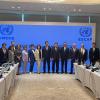News
Displaying Results 1 - 25 of 39
Increasing the use of digital solutions including those developed by the United Nations Centre for Trade Facilitation and Electronic Business (UN/CEFACT) can enhance the sustainability and resilience of supply chains and strengthen global connectivity.
In a series of capacity-building activities…
The explosion in data availability is changing the world. UNECE and the international statistical community are working to ensure that data is used for the good of the public. Released today, the UNECE publication Data Stewardship and the Role of National Statistical Offices in the New Data…
UNECE has today released a detailed inventory of Thematic and Extended Accounts.
This new resource offers comprehensive insights into the economic accounts published by countries worldwide that expand on the classical measures included in core national accounts.
The System of National…
In recent years, the participating States of the United Nations Special Programme for the Economies of Central Asia (SPECA) - Afghanistan, Azerbaijan, Kazakhstan, Kyrgyzstan, Tajikistan, Turkmenistan, and Uzbekistan - have observed rapid growth in the number and impact of business incubators and…
With a long history of reliance on resource-based industries for growth, countries of the United Nations Special Programme for the Economies of Central Asia (SPECA) - Afghanistan, Azerbaijan, Kazakhstan, Kyrgyzstan, Tajikistan, Turkmenistan, and Uzbekistan - have embraced the power of innovation…
Delegations from over 40 countries in the wider European region convened in Geneva on 19-20 October to review progress towards the goals adopted by the landmark 1994 International Conference on Population and Development (ICPD) and discuss priorities for the future.
The two-day conference,…
Many incidents in freight transport are attributed to poor practices in the packing of freight containers, including inadequate securing of cargo, overloading and incorrect declaration of contents. The victims of these incidents may be the general public or transport and supply chain workers, who…
What value do official statistics offer? The work of National Statistical Offices (NSOs), which produce the headline figures on the economy, population and environment that we see in the news every day, is driven by a conviction that such work is uniquely valuable, playing an essential role in…
A UNECE working paper released today, Population and migration statistics in Armenia: current situation, future plans and ways to improve describes how Armenia is improving its statistics on population and migration by combining administrative data with sample surveys. The study reviews innovations…
During her recent two-day visit to Turkmenistan UNECE Executive Secretary Olga Algayerova spoke at international conference “Dialogue is a Guarantee of Peace” in Ashgabat and discussed areas of cooperation with the highest government officials, focusing on future circular, digital and green…
During its recent mission in Turkmenistan, a UNECE delegation presented a proposal for a new analytical project - “Trade and Innovation for Sustainable Development of Turkmenistan” - to the government and international stakeholders, aimed at supporting the country to enhance innovation governance…
UNECE and the QazTrade Center for Trade Policy Development are joining forces to advance sustainable trade and the circular economy in Kazakhstan. Kazakhstan is the first country in Central Asia to use the SPECA Principles of Sustainable Trade - a set of twenty principles, adopted by the countries…
SPECA countries are facing unique challenges, stemming from at least three crises: the need to deal with the regional and global repercussions of the COVID-19 pandemic, the political upheaval in Afghanistan, and the conflict in Ukraine. With the correct policies and mechanisms for subregional…
New good practice guidelines for statistical offices have been published by UNECE’s body of experts dedicated to modernizing official statistics. The role of brand management, marketing and crisis communications for Statistical Organisations examines the importance of reputation for producers of…
The Handbook on Forms of Employment, published today by UNECE, will help statisticians to assess the impacts of ever-increasing diversity in where, when, how and with whom we work.
The days of ‘working nine to five’ are, for many people, gone. In fact, the idea of having a stable, permanent, full-…
The Covid-19 pandemic continues to hit hard the countries of the United Nations Special Programme for the Economies of Central Asia (SPECA) and highlights the need to diversify from current, resource-dependent models of economic development. This will mean putting ‘innovation and technology that…
The heads of national statistical offices participating in the Conference of European Statisticians have (CES) welcomed UNECE’s new Guidance for measuring the impact of the Covid-19 pandemic on women and men.
The COVID-19 pandemic continues to disrupt many aspects of daily life. The…
Countries in the UN Special Programme for the Economies of Central Asia (SPECA) are falling behind potential on many metrics of innovation performance. R&D spending remains below 1 per cent of GDP, almost entirely publicly funded, and SPECA countries rely extensively on natural resources,…
A high-level mission of United Nations experts has reviewed the plans and preparations for the upcoming census of Turkmenistan, due to take place on 17-27 December 2022. Working alongside the State Statistics Committee of Turkmenistan, the delegation— a multi-agency team consisting of experts from…
The COVID-19 pandemic has brought about immense changes in how people move around the world. International travel ground almost to a halt at the onset of the crisis, as restrictions were imposed and borders closed. Internal migration, too, was restricted in many countries as lockdowns were declared…
Transitioning towards a knowledge-based economy away from a resource-intensive model of economic growth is central for sustainable development among the seven countries of the UN Special Programme for the Economies of Central Asia (SPECA) - Afghanistan, Azerbaijan, Kazakhstan, Kyrgyzstan,…
UNECE’s Expert Forum for Producers and Users of Climate Change-related Statistics took place in Geneva and online from 31 August to 3 September, in the run-up to COP26 later this autumn.
The annual UNECE expert forums bring together not only producers but also users of climate change-related…
The new UNECE Guide on producing CPI under lockdown, published today, helps national statistical offices to produce the Consumer Price index (CPI) under periods of lockdown and other emergencies.
The Consumer Price Index, or CPI, is a key economic indicator in most countries, giving a …
Developing the capacity of statistical systems to respond to ever-changing demands is a core component of UNECE statistical work, linked directly to several of the targets of the 2030 Agenda for Sustainable Development. Key tools used for capacity development have traditionally been face-to-face…
Countries of Central Asia, the Caucasus and Eastern Europe have been hit hard by the socioeconomic impacts of the COVID-19 pandemic, which threatens to derail sustainable development progress in the region.
However, there is also a stronger momentum towards regional cooperation, and countries can…


























